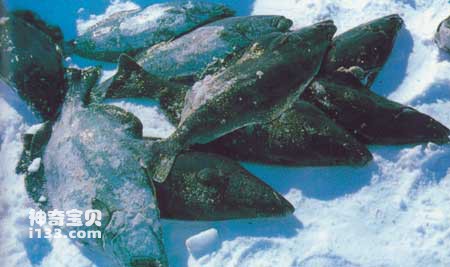There are three dorsal fins on the back and a small beard on the mouth, which are typical characteristics of cod. In northern my country, cod is called "big head fish" or "big head fish", while in North Korea, cod is called "pollen fish".
Cod is full of treasures. In addition to the edible meat, vitamin B can be extracted from the eyeballs and cod liver oil can be extracted from the liver. Cod liver oil is rich in vitamin A and vitamin D. At the same time, cod liver oil has an inhibitory effect on tuberculosis bacteria, so people suffering from tuberculosis can take cod liver oil for a long time. The pancreas can extract insulin, and the fat can be used to make fat glue. Cod fat gel can treat hemoptysis. The bones of cod are roasted and ground into powder and mixed into a paste to treat athlete's foot.

What needs to be particularly pointed out here is that carp liver is one of the important raw materials for making cod liver oil. For this reason, it is necessary to introduce a brief history of cod liver oil. Cod liver oil as a medicinal product originated from the ancient Inuit (Eskimos) and residents of Greenland and Norway. However, its industrial production was as late as 1847. The original method of producing cod liver oil was to place the livers of cod and whales in water, automatically separate the liver oil and water, and then skim the floating cod liver oil. In 1848, Norway began to use water steam heating. In 1880, Japan adopted the boiling method, creating a history of cod liver oil production in Japan.
Cod is a cold-water migratory fish that lives in the lower layers of the sea and has strong swarms, especially in the Atlantic Ocean. Therefore, the Atlantic Ocean is the "hometown of cod". Cod brought great wealth to the Nordic countries, especially Norway and Iceland. Icelanders call the smell of fish "the smell of money." Iceland supplies 6% of the world's fish to foreign markets every year. Today, 1 in 10 Icelanders is engaged in fishery production, and one of their incomes can support 7 Icelanders.
animal tags:
We created this article in conjunction with AI technology, then made sure it was fact-checked and edited by a Animals Top editor.